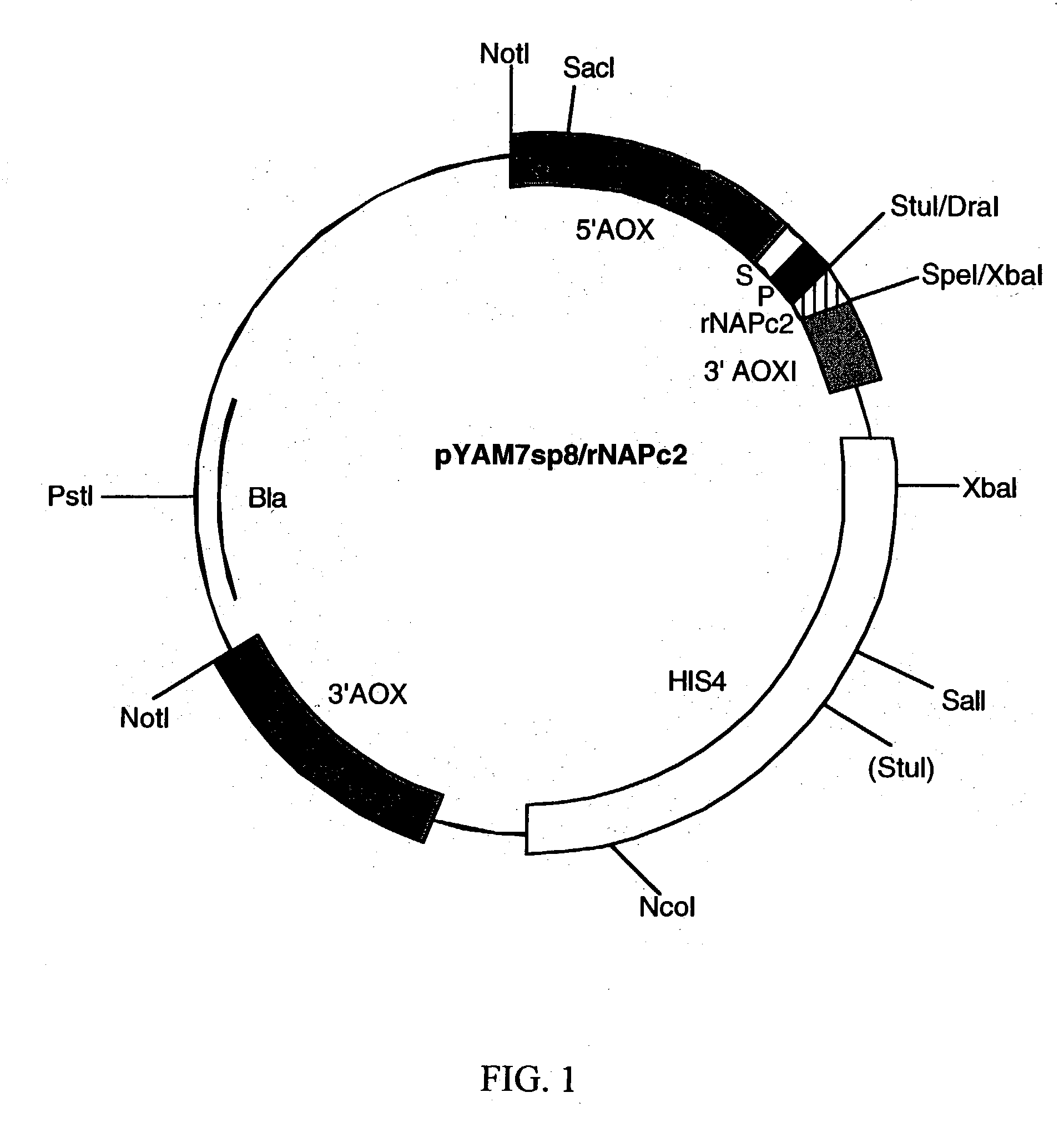Method of treatment of hemorrhagic disease using a factor VIIa/tissue factor inhibitor
a technology of tissue factor and hemorrhagic disease, which is applied in the field of hemorrhagic disease treatment using tissue factor inhibitors, can solve the problems of reducing affecting the survival rate of patients, so as to reduce or prevent the coagulopathy and/or inflammatory response
- Summary
- Abstract
- Description
- Claims
- Application Information
AI Technical Summary
Benefits of technology
Problems solved by technology
Method used
Image
Examples
example 1
[0102] Production of Recombinant Nematode-Extracted Anticoagulant Protein c2 / Proline (AcaNAPc2 / Proline or rNAPc2 / Pro)
[0103] A. Preparation of rNAPc2 / Pro Expression Plasmid and Pichia pastoris Expressing Clone
[0104] The rNAPc2 / Pro gene was cloned into the P. Pastoris expression vector, pYAM7sp8.sup.1, using PCR rescue. The pYAM7sp8 vector (see, FIG. 1) is a derivative of pHIL-D2.sup.2. It contains the promoter and transcriptional termination signal of the Pichia pastoris AOX1 gene, a secretion signal peptide (a fusion of the Pichia pastoris acid phosphatase signal sequence and the pro sequence of a hybrid S. cerevisiae .alpha.-mating factor), and the HIS4 marker for selecting transfectants.
[0105] The PCR primers used to rescue the rNAPc2 gene from the phage clone.sup.3 were:
[0106] A8 (.sup.5' GCG TTT AAA GCA ACG ATG CAG TGT GGT G.sup.3') (SEQ. ID. NO. 1) and A9 (.sup.5' C GCT CTA GAA GCT TCA TGG GTT TCG AGT TCC GGG ATA TAT AAA GTC .sup.3') (SEQ. ID. NO. 2).
[0107] These primers add Dr...
example 2
[0167] Evaluation of Factor VIIa / Tissue Factor (fVIIa / TF) Inhibitor in a Non-Human Primate Model of Acute Infection with Ebola Virus (EBOV).
[0168] Filovirus-nave rhesus macaques (Macaca mulatta) were randomized into one experimental group consisting of four monkeys (three females, one male), and one control group consisting of one animal (male). All animals were exposed to 1000 plaque forming units (PFU) of EBOV (Zaire subtype) by intramuscular injection following a .gtoreq.one week acclimation to a biosafety level (BSL)-4 animal room located at the United States Army Medical Research Institute of Infectious Diseases (USAMRIID), Fort Detrick, Maryland. Animals in the experimental group were treated with 30 .mu.g / kilogram body weight (kg) of the test fVIIa / TF inhibitor (rAcaNAPc2 / proline) by a single subcutaneous injection within 1 hour after virus challenge, and continuing daily for 14 days after exposure to EBOV. The control animal received an equivalent volume of placebo (a modifi...
example 3
[0172] Assays for Measuring the Inhibition of the fVIIa / TF Complex by a Test Compound
[0173] A. fVIIa / TF fIX Activation Assay
[0174] This example measures the ability of a test compound to act as an inhibitor of the catalytic complex of fVIIa / TF, which has a primary role in initiation of the coagulation response in the ex vivo prothrombin time assay (Example 5). Activation of tritiated Factor IX by the rFVIIa / rTF / PLV complex was assessed by determining the respective intrinsic inhibition constant, Ki*.
[0175] Lyphilized, purified, recombinant human factor VIIa was obtained from BioPacific, Inc. (Emeryville, Calif.), and reconstituted in HBS (10 mM HEPES, pH 7.5, 150 mM sodium chloride) prior to use. Purified human Factor X was obtained from Enzyme Research Laboratories, Inc. (South Bend, Ind.) and Factor Xa (free FXa) was activated and prepared from it as described (Bock, P. E., Craig, P. A., Olson, S. T., and Singh, P. Arch. Biochem. Biophys. 273:375-388 (1989)). Active site-blocked h...
PUM
| Property | Measurement | Unit |
|---|---|---|
| optical density | aaaaa | aaaaa |
| temperatures | aaaaa | aaaaa |
| temperatures | aaaaa | aaaaa |
Abstract
Description
Claims
Application Information
 Login to View More
Login to View More - R&D
- Intellectual Property
- Life Sciences
- Materials
- Tech Scout
- Unparalleled Data Quality
- Higher Quality Content
- 60% Fewer Hallucinations
Browse by: Latest US Patents, China's latest patents, Technical Efficacy Thesaurus, Application Domain, Technology Topic, Popular Technical Reports.
© 2025 PatSnap. All rights reserved.Legal|Privacy policy|Modern Slavery Act Transparency Statement|Sitemap|About US| Contact US: help@patsnap.com

